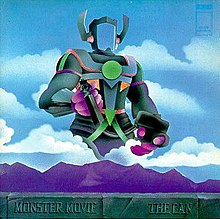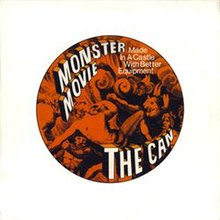| Monster Movie | ||||
|---|---|---|---|---|
 | ||||
| Studio album by Can | ||||
| Released | 2 August 1969 | |||
| Recorded | July 1969 | |||
| Studio | Schloss Nörvenich (Nörvenich, West Germany) | |||
| Genre | ||||
| Length | 38:05 | |||
| Label |
| |||
| Producer | Can | |||
| Can chronology | ||||
| ||||
| Original cover | ||||
 1969 Music Factory issue 1969 Music Factory issue | ||||
| Review scores | |
|---|---|
| Source | Rating |
| AllMusic | |
| BBC | very favorable |
| Encyclopedia of Popular Music | |
| The Great Rock Discography | 7/10 |
| Pitchfork | 8.7/10 |
| The Rolling Stone Album Guide | |
| Spectrum Culture | 5/5 |
| Spin Alternative Record Guide | 7/10 |
| Stylus Magazine | A |
| Tom Hull | A− |
Monster Movie is the debut studio album by German rock band Can, released in August 1969 by Music Factory and Liberty Records.
Background and recording
In 1968, Can had recorded an album entitled Prepared to Meet Thy PNOOM, which no record company agreed to release; these recordings were eventually released in 1981 as Delay 1968. Monster Movie was the group's subsequent attempt at a more commercial record. The album is credited to "The Can", a name suggested by vocalist Malcolm Mooney and adopted by democratic vote. Previously the band had been known as "Inner Space", which later became the name of their recording studio. Some copies of the LP bore the subtitle "Made in a castle with better equipment", referring to Schloss Nörvenich, the 14th-century castle in Nörvenich, North Rhine-Westphalia, where the band recorded from 1968–69.
Monster Movie was mastered at Studio for Electronic Music (WDR) in Cologne by Can's engineer Holger Czukay, the former student of Karlheinz Stockhausen.
Artwork
The image on the cover is a retrace of Galactus, as originally depicted by Jack Kirby (inked by Vince Colletta) in Marvel's Thor #134 - page 3, released in 1966. The original sleeve art, produced by Music Factory and designed by artist Helge Bauch, features a large orange circle against a white background containing a printmaking drawing. The head of the Music Factory, Karlheinz Freynik, described the drawing as "mystical from Greek myths that fits to the music". Rob Young, Can's biographer, saw a naked old man on the drawing "peering into what looks like the flaming portal of hell. He is surrounded by demons and a goat-headed man gnawing on a limb".
Content
Monster Movie brings together elements of psychedelic rock, blues, free jazz, world music and other styles, the influence of the Velvet Underground being particularly obvious on the opening track "Father Cannot Yell". The use of improvisation, experimentation, tape editing and layering of sounds set a standard for Can's subsequent albums in the early 1970s, which helped form the style labeled "krautrock" by the British music press. The 20-minute closing track "Yoo Doo Right" was edited down from 6 hours of improvisation. The lyrics of "Mary, Mary So Contrary" are based on the English nursery rhyme "Mary, Mary, Quite Contrary".
Monster Movie was the last Can album on which Malcolm Mooney performed all of the vocals until Rite Time, recorded in late 1986 and issued in 1989.
Release and reception
Monster Movie initially came out in late August 1969 on a small German label "Music Factory". Kalle Freynik, the head of the label, as a part of his contract with the band had a goal to "promote the product as good as the label can, and when there's any reaction the label will try to get it on a major label". The initial pressing was five hundred copies, distributed by Freynik "in carefully selected head shops and underground shops to boost the band's reputation by word of mouth". The first pressing quickly sold out, and Freynik approached Liberty Records/United Artists signing a distribution deal for Monster Movie. Liberty's issue released in May 1970 with an updated cover.
Richard Williams, writing for New Musical Express, identified the Velvet Underground influence on the album's shorter tracks, bu admitted "they have a lot of themselves to offer, mainly in the field of electronics, which they use with sparing brilliance, and the interplay between the Morse-code organ and the machine-gun drums on "You Do Right" [sic] is extremely startling". Williams praised Malcolm's performance—"wailing and screaming fits perfectly where a less reticent singer would obtrude. In fact they use another of the Velvets' favourite tricks, putting the voice beneath the instruments so that it tantalises the listener unbearably."
"Father Cannot Yell" Sound sample of the opening track of the album.Problems playing this file? See media help.
Track listing
All tracks are written by Can (Holger Czukay, Michael Karoli, Jaki Liebezeit, Irmin Schmidt, and Malcolm Mooney).
| No. | Title | Length |
|---|---|---|
| 1. | "Father Cannot Yell" | 7:06 |
| 2. | "Mary, Mary So Contrary" | 6:22 |
| 3. | "Outside My Door" | 4:11 |
| No. | Title | Length |
|---|---|---|
| 4. | "Yoo Doo Right" | 20:27 |
| Total length: | 38:06 | |
Personnel
- Can
- Irmin Schmidt – keyboards
- Jaki Liebezeit – drums
- Holger Czukay – bass guitar
- Michael Karoli – electric guitar
- Malcolm Mooney – vocals, harmonica
References
- "Facebook post by official Can account". August 2019. Archived from the original on August 12, 2024.
- Young & Schmidt 2018, p. 88.
- Bell, Max (11 April 2018). "Can: The making of landmark album Tago Mago". Louder Sound. Retrieved 23 May 2020.
- Keylock, Miles (2005). "Can - Future Days". In Dimery, Robert (ed.). 1001 Albums You Must Hear Before You Die. London: Cassell Illustrated. p. 293.
- Thomas, Fred. "Can - Monster Movie Album Reviews, Songs & More". AllMusic. Retrieved 1 November 2011.
- Barnes, Mike (2005). "Review of Can - Monster Movie / Soundtracks / Tago Mago / Ege Bamyasi". BBC. Retrieved 23 May 2020.
- Larkin, Colin (2011). "Can". Encyclopedia of Popular Music (5th ed.). Omnibus Press. ISBN 978-0857125958.
- Leone, Dominique (10 November 2004). "Can: Monster Movie". Pitchfork. Retrieved 2 October 2020.
- Brackett, Nathan; Hoard, Christian David (2004). The New Rolling Stone Album Guide. Simon and Schuster. ISBN 9780743201698.
- Southall, Nick (7 January 2005). "Can: Monster Movie / Soundtracks". Stylus Magazine. Retrieved 1 November 2011.
- Hull, Tom. "Grade List: can". Tom Hull - on the web. Retrieved 4 September 2020.
- Strong, Martin C. (1998). The Great Rock Discography (1st ed.). Canongate Books. ISBN 978-0-86241-827-4.
- Weisbard, Eric; Marks, Craig, eds. (1995). "Minutemen". Spin Alternative Record Guide (1st ed.). New York: Vintage Books. ISBN 0-679-75574-8.
- Cole, Jake (3 September 2014). "Can: Monster Movie/Soundtracks/Tago Mago/Ege Bamyasi - Album Review". Spectrum Culture.
- Czukay, Holger (May 1997). "Short History of the Can - Discography". Perfect Sound Forever. furious.com. Retrieved 1 November 2011.
- Warner, Alan (2014). TAGO MAGO, London, UK; Bloomsbury Academic ISBN 978-1628921083, page 79
- Cavanaugh, David (14 November 2011). "Can – Tago Mago R1971". Uncut. Retrieved 28 July 2012.
- Young & Schmidt 2018, p. 93.
- "Stan Lee". Lambiek. Retrieved 23 May 2020.
- "70s Sci-Fi Art".
- Young & Schmidt 2018, p. 91.
- ^ McGurk, Mike. "Monster Movie". Rhapsody. Archived from the original on 2 April 2013. Retrieved 28 July 2012.
- Stubbs, Peter. "Album by Album: Can". Uncut. Retrieved 28 July 2012.
- Young & Schmidt 2018, p. 311.
- Young & Schmidt 2018, p. 313.
- Young & Schmidt 2018, p. 91-92.
- Young & Schmidt 2018, p. 92.
- Young & Schmidt 2018, p. 92-93.
- Richard Williams (30 May 1970). "The Can: Monster Movie review". New Musical Express.
Works cited
- Young, Rob; Schmidt, Irmin (2018). All Gates Open: The Story of Can. London: Faber and Faber. ISBN 978-0571311491.
| Can | |
|---|---|
| Albums | |
| Compilations | |
| Live albums | |
| Songs |
|
| Related articles | |